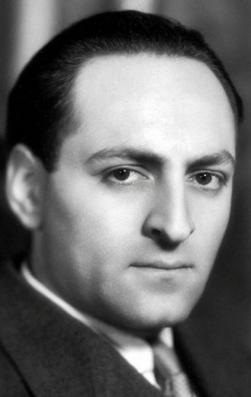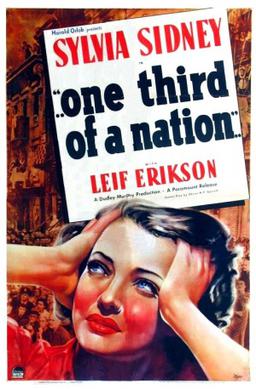
George Raft was an American film actor and dancer identified with portrayals of gangsters in crime melodramas of the 1930s and 1940s. A stylish leading man in dozens of movies, Raft is remembered for his gangster roles in Quick Millions (1931) with Spencer Tracy, Scarface (1932) with Paul Muni, Each Dawn I Die (1939) with James Cagney, Invisible Stripes (1939) with Humphrey Bogart, and Billy Wilder's comedy Some Like It Hot (1959) with Marilyn Monroe and Jack Lemmon; and as a dancer in Bolero (1934) with Carole Lombard and a truck driver in They Drive by Night (1940) with Ann Sheridan, Ida Lupino and Bogart.

Sylvia Sidney was an American stage, screen, and film actress whose career spanned 70 years. She rose to prominence in dozens of leading roles in the 1930s. She was nominated for the Academy Award for Best Supporting Actress for her performance in Summer Wishes, Winter Dreams in 1973. She later gained attention for her role as Juno, a case worker in the afterlife, in Tim Burton's 1988 film Beetlejuice, for which she won a Saturn Award for Best Supporting Actress.

The Bowery is a 1933 American pre-Code historical comedy-drama film set in the Lower East Side of Manhattan around the start of the 20th century directed by Raoul Walsh and starring Wallace Beery and George Raft. The supporting cast features Jackie Cooper, Fay Wray, and Pert Kelton.

If I Had a Million is a 1932 American pre-Code Paramount Studios anthology film starring Gary Cooper, George Raft, Charles Laughton, W. C. Fields, Jack Oakie, Frances Dee and Charlie Ruggles, among others. There were seven directors: Ernst Lubitsch, Norman Taurog, Stephen Roberts, Norman Z. McLeod, James Cruze, William A. Seiter, and H. Bruce Humberstone. Lubitsch, Cruze, Seiter, and Humberstone were each responsible for a single vignette, Roberts and McLeod directed two each, and Taurog was in charge of the prologue and epilogue. The screenplays were scripted by many different writers, with Joseph L. Mankiewicz making a large contribution. The film is based on the 1931 novel Windfall by Robert Hardy Andrews.
Norman Krasna was an American screenwriter, playwright, producer, and film director who penned screwball comedies centered on a case of mistaken identity. Krasna directed three films during a forty-year career in Hollywood. He garnered four Academy Award screenwriting nominations, winning once for 1943's Princess O'Rourke, which he also directed.
Manpower is a 1941 American crime melodrama directed by Raoul Walsh and starring Edward G. Robinson, Marlene Dietrich, and George Raft. The picture was written by Richard Macaulay and Jerry Wald, and the supporting cast features Alan Hale, Frank McHugh, Eve Arden, Barton MacLane, Ward Bond and Walter Catlett.

The House Across the Bay is a 1940 film directed by Archie Mayo, starring George Raft and Joan Bennett, produced by Walter Wanger, written by Myles Connolly and Kathryn Scola, and released by United Artists. The supporting cast features Lloyd Nolan, Walter Pidgeon and Gladys George.

Mr. Ace is a 1946 American film noir starring George Raft and Sylvia Sidney involving a society woman who taps a gangster for his political support as she runs for Congress. The movie was written by Fred F. Finkelhoffe, directed by Edwin L. Marin, and photographed by legendary cinematographer Karl Struss.

You and Me is a 1938 American crime drama/comedy/romance film directed by Fritz Lang. It stars Sylvia Sidney and George Raft as a pair of ex-convicts on parole, working in a department store whose owner, played by Harry Carey, routinely hires former criminals to give them a second chance. It was written by Norman Krasna and Virginia Van Upp.

All of Me is a 1934 American pre-Code drama film directed by James Flood and starring Fredric March, Miriam Hopkins, and George Raft. The film was written by actor Thomas Mitchell and Sidney Buchman from Rose Porter's play Chrysalis.

Rumba is a 1935 American musical drama film starring George Raft as a Cuban dancer and Carole Lombard as a Manhattan socialite. The movie was directed by Marion Gering and is considered an unsuccessful follow-up to Raft and Lombard's smash hit Bolero the previous year.

Dorothy Layton was an American film actress of the early 1930s.

Merrily We Go to Hell is a 1932 pre-Code film directed by Dorothy Arzner, and starring Fredric March and Sylvia Sidney. The supporting cast features a prominent early appearance by Cary Grant, billed ninth in the cast but with a larger part than this would suggest. The picture's title is an example of the sensationalistic titles that were common in the pre-Code era. Many newspapers refused to publicize the film because of its racy title. The title is a line March's character says while making a toast.

Mary Burns, Fugitive is a 1935 American drama film directed by William K. Howard.

Parole Girl is a 1933 American pre-Code romantic drama film directed by Edward Cline. The film stars Mae Clarke and Ralph Bellamy.

Marion Gering was a Russian-born American stage producer and director. He moved to the United States in 1923 as an artist. He became involved in the theatrical community in Chicago, founding the Chicago Play Producing Company.

Jennie Gerhardt is a 1933 American pre-Code drama film directed by Marion Gering for Paramount Pictures. It stars Sylvia Sidney, Mary Astor, and Edward Arnold. The film is based on the 1911 novel Jennie Gerhardt by Theodore Dreiser.

Ladies of the Big House is a 1931 American pre-Code drama film directed by Marion Gering and written by Ernest Booth, William Slavens McNutt and Grover Jones. The film stars Sylvia Sidney, Gene Raymond, Wynne Gibson, Earle Foxe, Rockliffe Fellowes, Purnell Pratt and Frank Sheridan. The film was released on December 26, 1931, by Paramount Pictures.

...One Third of a Nation... is a 1939 American drama film directed by Dudley Murphy and written by Oliver H.P. Garrett and Dudley Murphy. The film stars Sylvia Sidney, Leif Erickson, Myron McCormick, Hiram Sherman, the future director Sidney Lumet and Muriel Hutchison. The film was released on February 10, 1939, by Paramount Pictures.

"Helen Morgan" is an American television play broadcast on May 16, 1957, as part of the CBS television series, Playhouse 90. It was the 33rd episode of the first season of Playhouse 90.



















